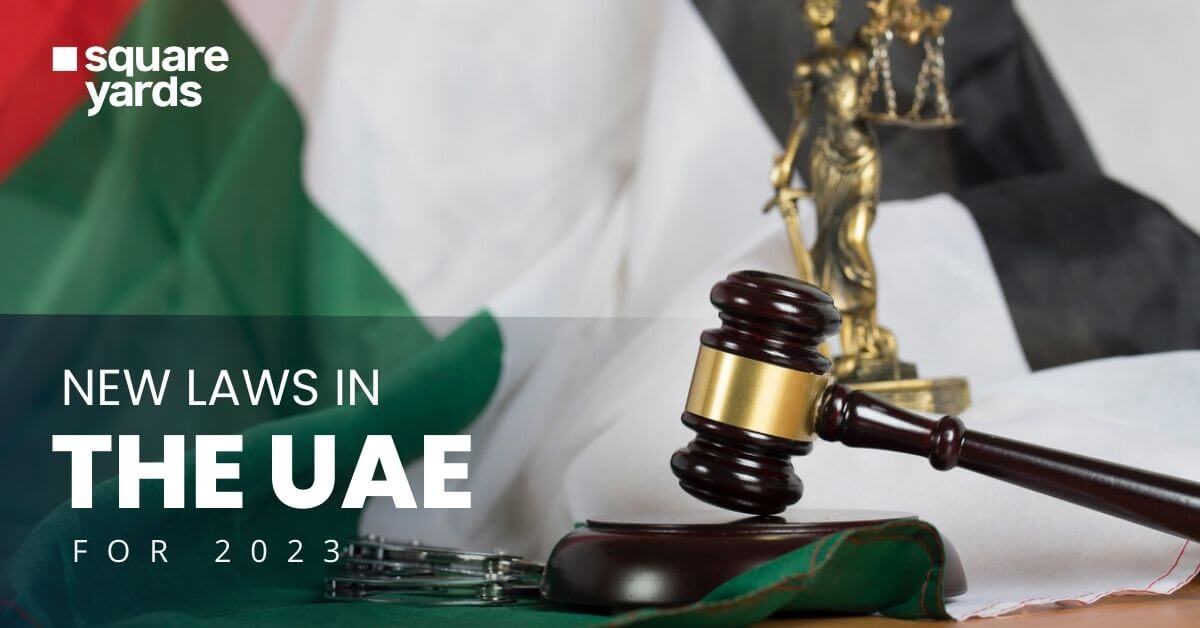The UAE is a diversified country with various cultures and lifestyles. One thing that makes this place unique is its laws. The year 2023 will be a pivotal year for the residents of the UAE. The residents and non-residents are expected to witness some new laws in UAE this year. The authorities have taken multiple initiatives to boost the country’s records. Last year was about a new visa regime and labour reforms. This year UAE’s new laws have highlighted the other sections of the law. From Emiratisation fines to the imposition of a plastic ban, there are a few new laws in UAE that you should know about. Let’s learn more about them in detail.
Five New UAE Laws That Will Come into Effect in 2023

With the new law’s introduction, the UAE looks forward to creating another momentous year for its residents. These new laws in UAE 2023 include the introduction of Corporate Tax, Emiratisation targets for companies, mandatory insurance against job loss or unemployment insurance scheme, personal status law for non-Muslims and imposition of the plastic ban.
1. Unemployment Insurance Scheme
According to the new law, it has become mandatory for employees to purchase insurance against job loss. This applies to employees working in the federal government departments and the private sector.
The Dubai Insurance Company offers the scheme, which represents a pool of nine insurance companies. Emiratis and other employees working in the private sector or federal government departments will receive a social security form if they suddenly lose their job. In a situation like this, the unemployment insurance scheme will offer some financial support for upto three months.
-
- The employees will mainly fall under two categories:
- Employees with a salary of AED 16,000 or less must pay AED 60 annually or a monthly insurance amount of AED 5. The compensation for this category must not exceed a monthly amount of AED 10,000.
- Employees with a salary above AED 16,000 will have to pay AED 120 annually or AED 10 monthly. The compensation amount for this category will not exceed AED 20,000 monthly.
- The employees will mainly fall under two categories:
Exceptions include investors and business owners who manage their businesses themselves, individuals working on a temporary basis, domestic workers, juveniles under the age of 18 and retirees who live on their pensions and have joined a new company; people who fall under these few categories are exempted from this law.
There are options available where employees can choose to pay the amount on a monthly, quarterly, half-yearly or annual basis. Coordination with the insurance company is essential to secure additional benefits.
2. Emiratisation Rule

Every company with more than 50 employees must have an Emiratisation rate of 2% for skilled jobs. Companies which refuse to follow the Emiratisation rule will face financial penalties. These penalties are being collected starting January 2023. a monthly penalty fine of AED 6,000 will be imposed for every UAE national who has not been appointed. The fine will be collected in a single instalment.
In a situation where an Emirati resigns from a private company, the company must make sure to get an Emirati replacement and meet the target. Companies with a successful target completion will receive various incentives, including an 80% discount on Mohre fees. the value of the monthly penalty will continue to increase annually at a rate of AED 1,000 until 2026. Private sector firms are expected to achieve a 10 per cent growth rate in their employment targets.
3. Corporate Tax
The firms earning AED 375,000 profit per annum are required to pay a tax of 9%. The tax will be applicable on the profit amount, not on the firm’s total turnover. Individuals with a freelance permit working on a self-sponsorship basis will be subjected to corporate tax in UAE if the income is in excess. Real estate income acquired from economic activities like leasing and selling is subjected to corporate tax. This will be done based on conditions stated during executive decisions. If the income comes from real estate investments involving commercial activities managed by an investment manager, it will come under exempt income. Non-residents of the UAE with permanent establishments and state-sourced income are also subjected to tax law.
The law will not apply to personal income acquired from bank deposits, savings, investments, dividends or foreign exchange gains. Non-residents receiving income by operating aircraft and ships in international areas are not subjected to corporate law. Non-resident income earned through an investment manager on real estate or other investments will not fall under this legislation. If a qualifying Free Zone person meets all the conditions mentioned in the Executive Regulations of the UAE Corporate Tax Law will be considered exempt. Natural resource extraction activities are only subjected to emirate-level taxation. Investment funds, public benefits, pension funds and government-related activities are not applicable to this law.
4. Personal Status Law
The new Personal Status Law came into effect on February 1, 2023. Provisions of this law apply to non-Muslim foreigners residing in the UAE unless someone adheres to his country’s law. Instead of the provisions mentioned in the UAE Decree-Law, non-Muslim foreigners may agree to follow other legislation related to family or personal status. The federal personal status law is a step towards modernising the country’s legal system.
The new legislation meets the conditions and procedures of documenting and contracting a marriage before the competent courts. Non-Muslim couples will be allowed to marry following a non-Sharia legal process. It also mentions the procedure of getting divorced, jointly or unilaterally. The introduction of ‘no-fault’ divorce is an important point to note. Either spouse can express the desire to terminate the marriage without being required to justify any wrongdoing during the marriage. Additionally, provisions regarding the shared custody of the children and settling of the financial claims after divorce are also covered under this law. It also organises the inheritance process, testaments or wills and proofs of paternity.
5. Plastic Ban

From January 2023, Ajman and Al Quwain have introduced a ban on single-use plastics. If a shopper asks for plastic, sales outlets must charge 25FIL extra per plastic bag. This single-use plastics ban is already applicable since 2022 in retail outlets in Abu Dhabi and Sharjah, where consumers are charged extra to reduce single-use plastics in the country. The country’s effort to ban plastics will lead to a much-needed change in pollution levels.
The Bottom Line
The laws mentioned above will give you a better understanding of what is happening in the UAE. It is important to learn and review some of the important changes that will be taking place in the UAE this year. The residents’ daily lives will be affected by the new policies of marriage, divorce, inheritance and child custody. Companies have started making changes to meet Emiratisation targets. The country has taken a lot of measures to strengthen its legal system.
More Useful Articles for You :
|
Know About Tenancy Laws in Abu Dhabi |
|
|
Guide To Real Estate Laws in Dubai |
|
|
All About Abu Dhabi Property Laws |
|
|
What is New UAE Labour Law 2022 |
|
|
Understand New Bounced Cheque Law in UAE |
Frequently Asked Question (FAQs)
One of the new UAE laws is the Personal Status Law. Under this, divorce can be now initiated by the mutual consent of both parties or even by any one of the spouses alone. Articles 6,7, and 8 of the Abu Dhabi laws have explained the aspect of no-fault divorces in this, the spouses can seek divorce without being legally obligated to prove that their partner is at fault or has caused any harm during the marriage. After a divorce, both parents will have the child's joint custody unless they have objections. Joint child custody is the default norm until the child attains maturity, after which they can decide for themselves. If there's a dispute, the court shall decide in the child's best interests.
The UAE has launched a national plan titled 'We The UAE 2031' outlining the country's development roadmap for the next ten years, focusing on economy, society and diplomacy. At an annual senior-level government gathering, Dubai's leader Sheikh Mohammed bin Rashid Al Maktoum made the announcement.
Some of the activities that are not allowed in the UAE include: Recreational drugs and narcotic substances. Pirated content. Fake currency. Items that are used in black magic, witchcraft or sorcery. Publications and artwork that contradict or go against Islamic teachings and values. Gambling tools.
Dubai has strict laws when it comes to alcohol consumption, dress, sexual conduct, and social behaviours in general that are essential for visitors to take notice of. Some of these legal guidelines consist of consuming alcohol only in your home, and at licensed venues, which means while living in Dubai, tourists must apply for a licence to buy alcohol and preserve it at home.
The new corporate tax law was announced in January this year, which will levy a standard rate of 9% on taxable profits of more than AED 375,000 ($102,110). The tax is introduced to align the UAE with international standards, particularly the Global Minimum Tax on multinational corporations endorsed by the G20 major economies. What is the new law in the UAE?
What are the future plans of the UAE?
What is not allowed in the UAE?
How strict are the laws in the UAE?
What is the new corporate tax law in the UAE?




